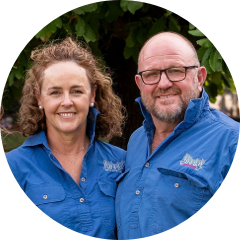Increasing on-farm adoption of broadleaf species
This project was completed in 2014.
Project Officer
Allison Glover
WHY THIS PROJECT WAS NEEDED
Most grain-growers recognise the need to include broadleaf species in their cropping program to reduce disease incidence for cereals, control weeds, and to improve soil nitrogen fertility. However, at the time of project inception, it was noted that the area sown to pulse legume crops or canola had dramatically declined over the previous 8-10 years.
It was also observed that while 65-70% of grain produced in the southern region was grown in rotation with pastures, many of these pastures tended to have low legume contents and therefore provided little benefit to subsequent crops.
There had been many good reasons why growers had reduced the frequency of use of broadleaf species: this was mostly related to late starts to the growing season, drought and risk aversion. Yet much of the decline was also attributed to the wide-spread perception that broadleaf options were not as profitable as cereals.
This project examined the productivity and financial implications of growing legumes or brassicas in various genotype x environment x management (G x E x M) combinations in cereal-based systems and re-evaluated the full value of integrating broadleaf species in a cropping sequence.
In short: Although grain growers recognise the need for broadleaf crops in rotations, their usage declined due to various factors. We evaluated the productivity and financial implications of reintroducing legumes or brassicas in cereal-based systems, aiming to provide guidelines for optimal crop rotations.
Project focus
The project aimed to:
- Quantify the rotational benefits of broadleaf crops or pastures for cereals through participatory research in partnership with key agribusiness consultants and leading grower groups across southern and central NSW, Victoria and south-eastern SA.
- Identify whether profitable broadleaf cropping sequence alternatives to continuous cereal cropping are available for low, medium and high rainfall zones, and irrigated systems.
- Provide grain-growers and their advisers with guidelines they can use to identify the circumstances when they can expect to derive the best outcome from the inclusion of different break crops.
Project outcomes
Key messages from this project included:
- Data collected from two research experiments between 2012 and 2013, and on-farm data collected during 2014 indicates that pasture legume hay, faba beans and canola can be as profitable, and often more profitable, than wheat.
- The relationship between legume dry matter (DM) production and nitrogen (N) fixation found in previous studies was consistent with the results from the current trial. In most cases during 2012, higher legume DM production resulted in greater amounts of nitrogen being fixed.
- Strategic timing of operations, such as hay cutting and brown manuring, provide opportunity for improved weed control when compared with harvesting crops for grain.
- While options such as brown manuring have negative gross margins in the first year, the reduction in weed control costs and nitrogen input costs can pay off over the cropping sequence through increased profitability of subsequent wheat crops, particularly if resistant weed populations are an issue.
Find out more
For further information. please email info@riverineplains.org.au
Project investment
This was an investment of the Grains Research and Development Corporation (GRDC).
Partners
Focus areas
MORE ON Grains
Our research enhances food production, increases environmental resilience and improves community connection across the Riverine Plains. See how our research creates impact.
-
Grains
Sustainability
-
Grains
Business
-
Grains
Sustainability
-
Grains
Livestock
-
Grains
Livestock
-
Grains
Sustainability
-
Grains
Business
-
Grains
Sustainability
-
Grains
-
Grains
-
Soils
Grains
-
Grains
Soils
-
Drought
Grains
-
Soils
Grains
-
Grains
-
Grains
Soils
-
Soils
Grains
-
Fodder
Grains
-
Grains
-
Grains
-
Grains
Soils
-
Sustainability
Grains
-
Grains
Sustainability
-
Soils
Grains
-
Grains
Sustainability
-
Livestock
Grains
-
Grains
Soils
-
Sustainability
Grains
JOIN RIVERINE PLAINS
Riverine Plains provides opportunities to see new research and innovation, connect with rural communities, and attend informative events.


